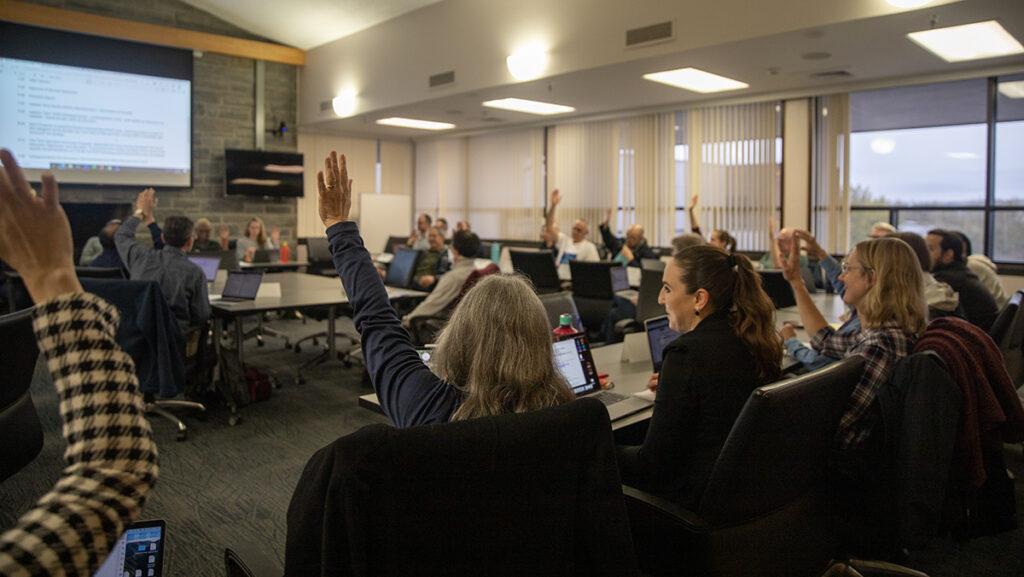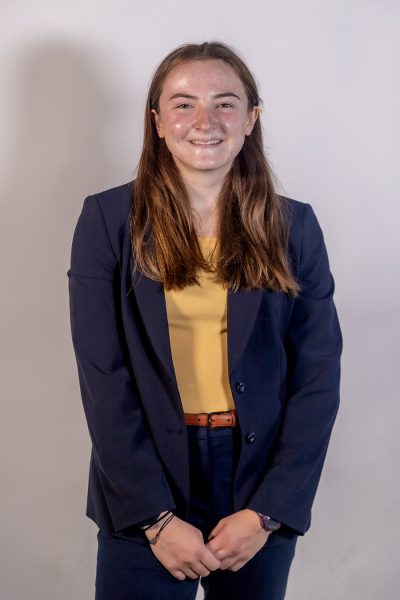In its May 2 meeting, the Ithaca College Faculty Council elected members for its 2023–24 executive committee, discussed faculty training and listened to reports from the provost and student proposals.
David Gondek, associate professor in the Department of Biology, was elected as chair; Lauren Steele, assistant professor in the Department of Media Arts, Sciences, and Studies, was elected as vice chair; Michael Trotti, professor in the Department of History, was elected as secretary; and Sara Levy, associate professor and chair of the Department of Education was elected as the Academic Policies Committee representative.
All of the candidates for the executive committee ran unopposed. There were no nominations for the two officer-at-large positions. Trotti said the executive committee has been primarily composed of faculty from the School of Humanities and Sciences and proposed that the council wait until its August 2023 meeting to see if members from the other schools would nominate themselves for the positions.
Melanie Stein, provost and senior vice president of academic affairs, then delivered her report. Stein said she and President La Jerne Cornish have hosted listening sessions throughout the semester to discuss integration — one of the goals in the Ithaca Forever strategic plans.
“Those sessions have been going really well,” Stein said. “They’ve been very well attended.”
Stein then addressed the college’s shared governance structure, in which the president, provost, the President’s Cabinet and the Board of Trustees work together to lead and decide the future direction for the college. Stein said the working group — a planning group for the strategic plan — has been working on increasing transparency by creating a shared governance value statement and grid of responsibilities.
“That group led to a series of three open sessions,” Stein said. “There was great feedback from the community in these sessions, which has resulted in a series of revisions of the document.”
Stein said the deans suggested that the college add a diversity advocate, an individual who ensures that processes and environments are as inclusive as possible, to each search committee for administrative positions for the 2022–23 academic year. She said that was successful, so she created a revised draft of the Procedures for Educational Affairs Faculty Searches to formally add diversity advocates to the search processes going forward.
First-year student Rishabh Sen, vice president of campus affairs of the Student Governance Council, proposed a student advising program along with senior Grace Madeya, former president of the student body. Sen and Madeya proposed piloting a peer advising program that would allow students of all five schools to work with upperclassmen on creating course schedules, looking for internships and fulfilling other academic goals.
Sen said that, based on an anonymous survey that was sent out to students to get their opinion on faculty and student advising, students experienced a lack of support. Sen said 89% of students from a sample size of 46 students shared their thoughts about the benefits of a student advising program. Sen clarified that the program would not replace faculty advisers, but offset some of their workload.
“We also feel that student advising is very important now, as we are moving to a pathways structure,” Sen said. “There is more guidance and more advising required as students have to learn to navigate themselves in more complex structures.”
Sen said the structure of the student or peer advising program would be modeled after that of Tutoring and Academic Enrichment Services, where a staff member leads the student advisory branch and a student adviser would work with a specific faculty adviser, much like how a Teaching Assistant would work with a professor of a specific course or department.
Senior Morgan Kingsley and Madeya presented the Civil Liberation Curriculum and training proposals for faculty. Madeya and Kingsley proposed training faculty and staff specifically about culturally aware teaching strategies, and decreasing bias, discrimination and microaggressions in class.
Kingsley said she and her team emailed informal surveys to more than 500 professors and 100 responded. Kingsley said out of this survey, three main ideas stood out to the team: previous training has felt repetitive and rehearsed, small group sessions are more effective for diversity, equity and inclusion training and it might be useful to bring an individual or group outside of the college to train faculty. Kingsley cited IC Rise Up’s seventh demand about anti-racism workshops for faculty.
“Students are meeting inside and outside of classes pleading for help from faculty [and their] support to grow as learners, future educators, future artists,” Kingsley said. “We know that many of you have participated [in these trainings] before. … We understand that it can get really repetitive, so we really want to build on skills you already know and expand your toolboxes.”
Cynthia Henderson, professor and chair in the Department of Theatre and Dance Performance said she is the co-facilitator of the Antiracism Institute in the School of Music, Theatre and Dance. Henderson said faculty training about antiracism and DEI is already present on campus. Henderson said members of IC Rise Up have been invited to attend a future meeting of the institute.
“It is one of those things where I know people hear about it but do they choose to make use of the training that is available,” Henderson said. “We go through about six weeks of training about equity literacy … but a lot of it is a matter of, ‘Will people actually sign up?”









